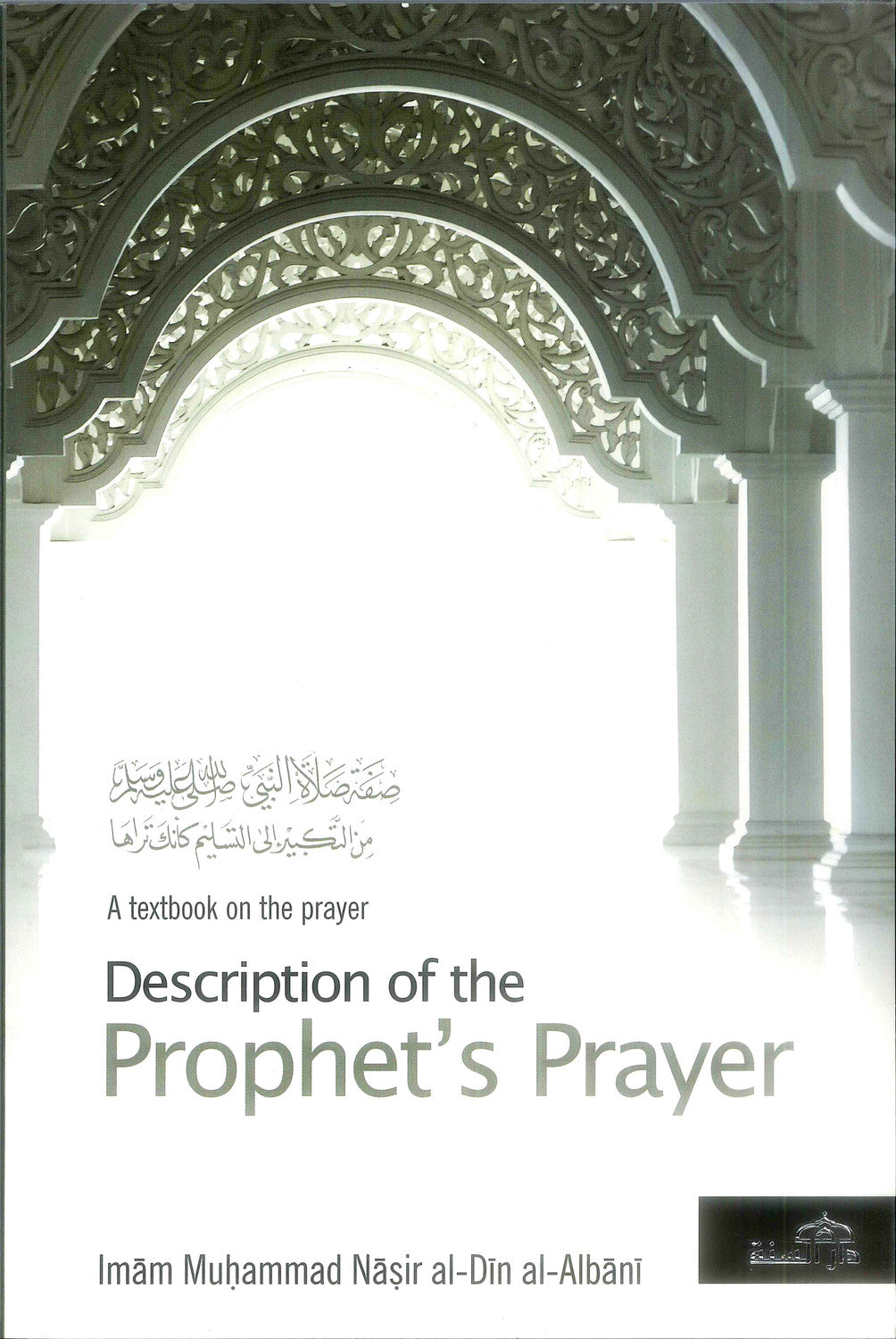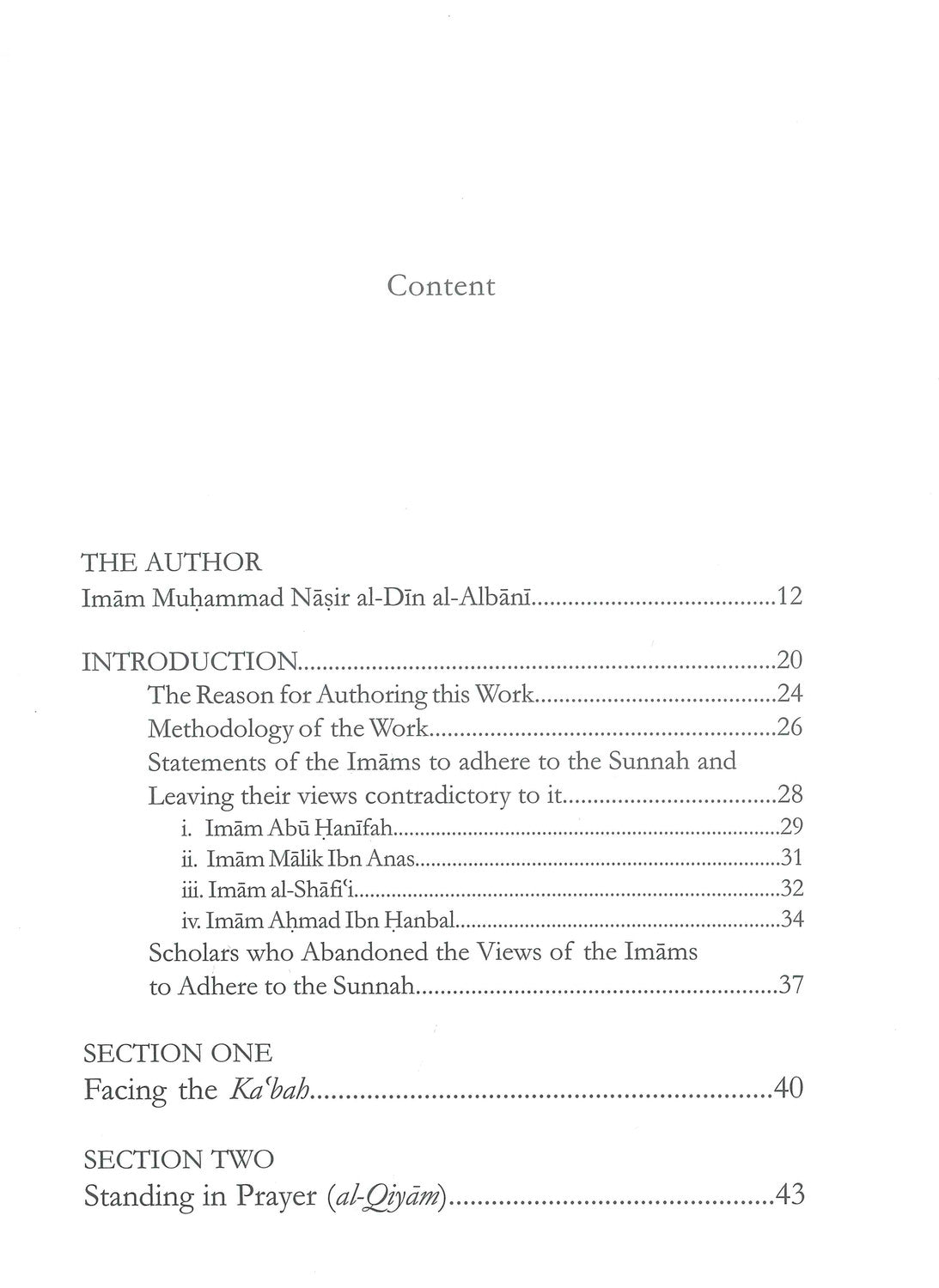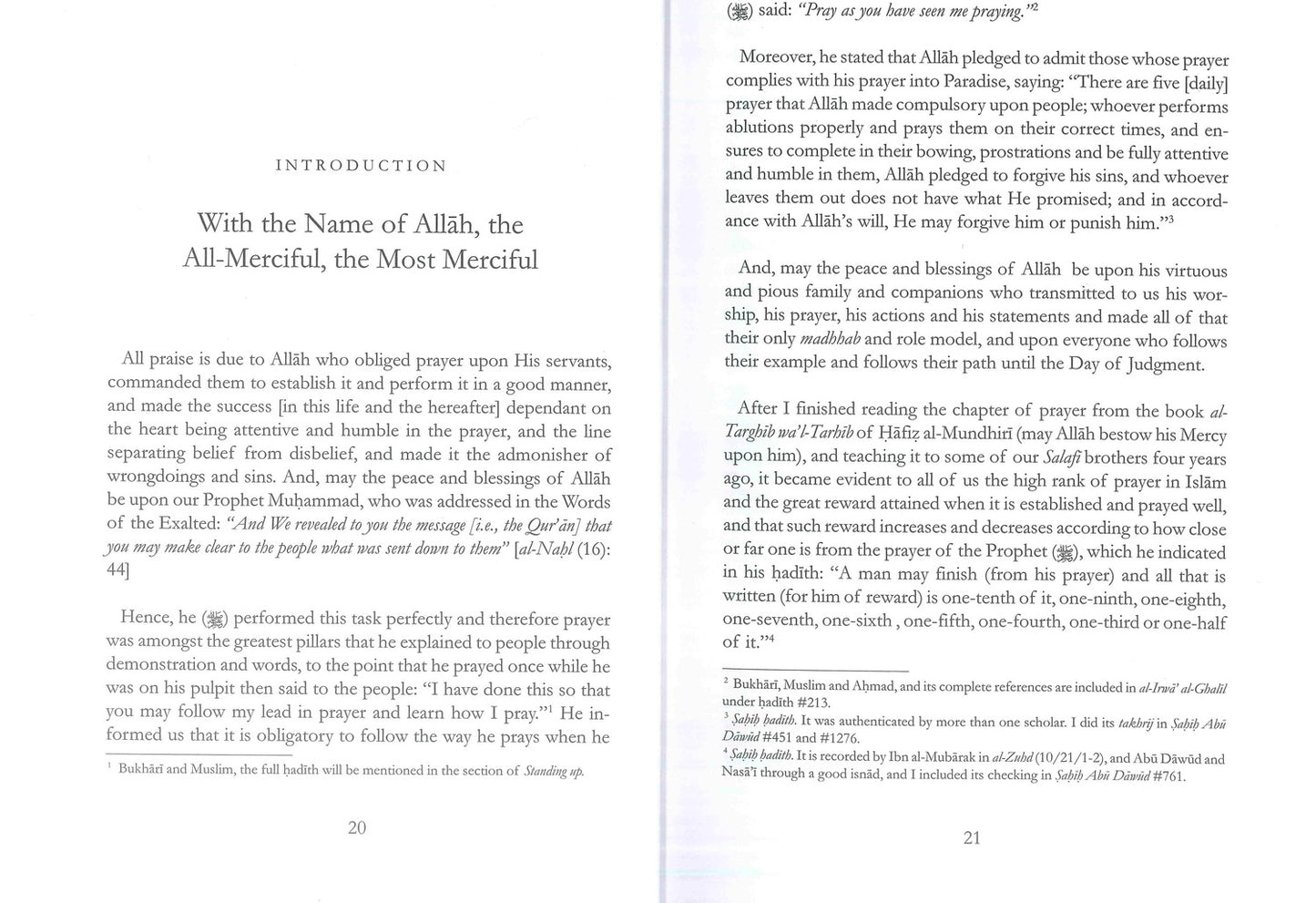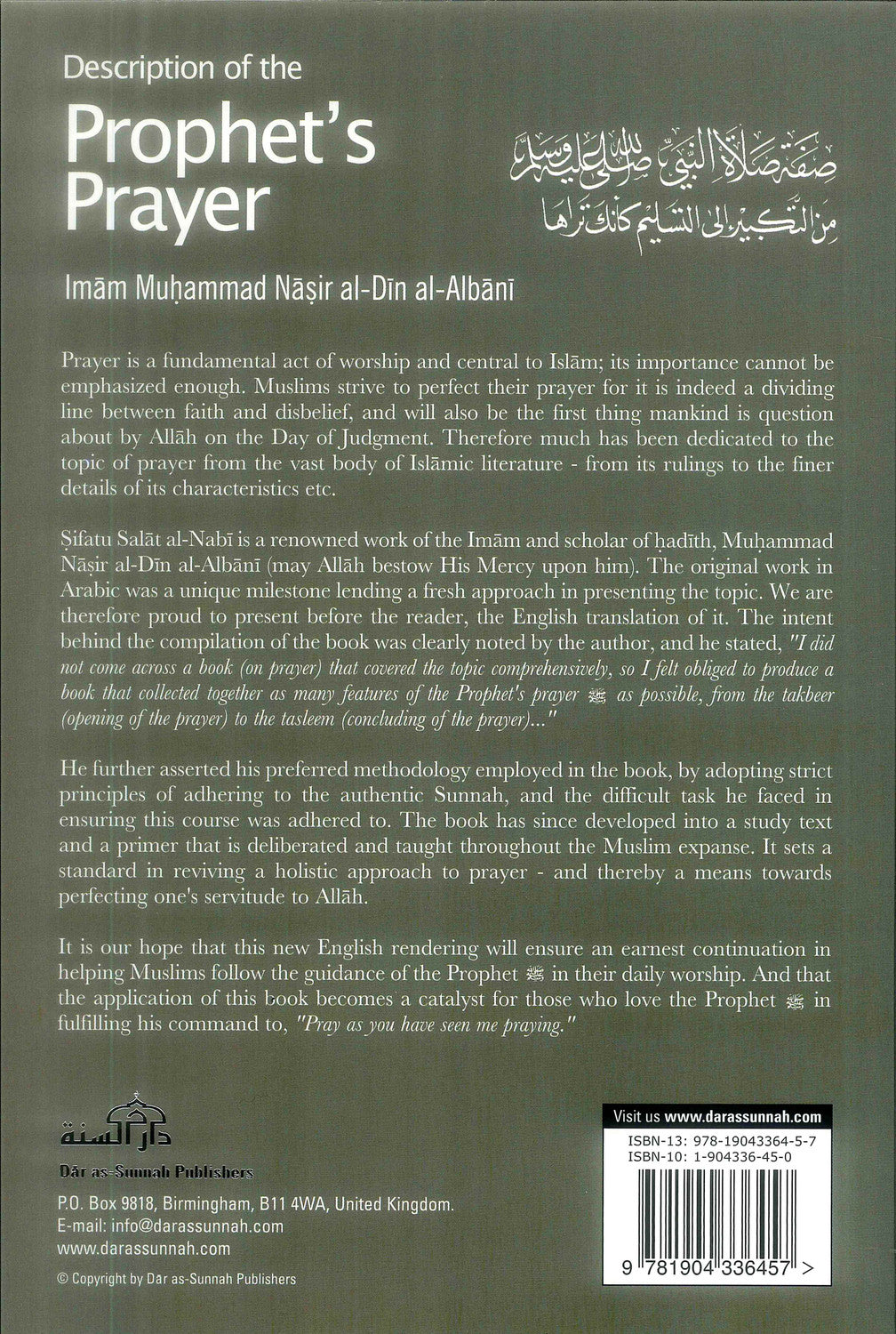Description of the Prophets Prayer By Imam Muhammad Nasir Al-Din al-Albani
Description of the Prophets Prayer By Imam Muhammad Nasir Al-Din al-Albani
Publisher:
Dar As Sunnah Publications
Author:
Imam Muhammad Nasir al-Din al-Albani
Language:
English
Binding:
Soft Cover
Pages: 175
Size: A5 |5.8 x 8.3 in| 14.8x 21 cm
Couldn't load pickup availability




Collapsible content
Description of Book
Prayer is a fundamental act of worship in Islam, and its significance cannot be overstated. Muslims strive to perfect their prayer as it is the first thing they will be questioned about on the Day of Judgment. The Prophet's prayer has been extensively studied and taught in the vast body of Islamic literature, from its rulings to its finer details. Sifat al-Salatun-Nabi, a renowned work by the late Imam and scholar of hadeeth, Muhammad Nasirudin Al-Albani (may Allah bestow His Mercy upon him), presents a fresh and comprehensive approach to the topic. We are proud to offer an abridged English version of this valuable text. The author's intent in writing this book was to collect and present as many features of the Prophet's prayer (peace and blessings of Allah be upon him) as possible, from its opening to its conclusion. This work adheres to strict principles of the authentic Sunnah, making it a valuable instrument for perfecting our serv
Publisher
Dar As Sunnah Publications
Author
- Imam Muhammad Nasir al-Din al-Albani
Sample Pages - Content
Page : 01
صفة صلاة الني الى لين التكبير إلى التسليم كانك تراها A textbook on the prayer Description of the Prophet's Prayer Imām Muḥammad Naşir al-Din al-Albānī
Page : 02
Content THE AUTHOR Imām Muḥammad Nasir al-Din al-Albāni..... INTRODUCTION.. ..12 .20 The Reason for Authoring this Work............. .24 Methodology of the Work...... ..26 Statements of the Imams to adhere to the Sunnah and Leaving their views contradictory to it.... ..28 i. Imam Abu Hanifah.. .29 ii. Imam Malik Ibn Anas... .31 iii. Imam al-Shafi'i. .32 iv. Imam Aḥmad Ibn Hanbal... .34 Scholars who Abandoned the Views of the Imāms to Adhere to the Sunnah.... .37 SECTION ONE Facing the Ka'bah....... .40 SECTION TWO Standing in Prayer (al-Qiyām).. ..43\
Page : 03
INTRODUCTION With the Name of Allah, the All-Merciful, the Most Merciful All praise is due to Allah who obliged prayer upon His servants, commanded them to establish it and perform it in a good manner, and made the success [in this life and the hereafter] dependant on the heart being attentive and humble in the prayer, and the line separating belief from disbelief, and made it the admonisher of wrongdoings and sins. And, may the peace and blessings of Allah be upon our Prophet Muhammad, who was addressed in the Words of the Exalted: "And We revealed to you the message [i.e., the Qur'an] that you may make clear to the people what was sent down to them" [al-Nahl (16): 44] Hence, he() performed this task perfectly and therefore prayer was amongst the greatest pillars that he explained to people through demonstration and words, to the point that he prayed once while he was on his pulpit then said to the people: "I have done this so that you may follow my lead in prayer and learn how I pray." He in- formed us that it is obligatory to follow the way he prays when he Bukhari and Muslim, the full ḥadīth will be mentioned in the section of Standing up. ()said: "Pray as you have seen me praying." 112 Moreover, he stated that Allah pledged to admit those whose prayer complies with his prayer into Paradise, saying: "There are five [daily] prayer that Allah made compulsory upon people; whoever performs ablutions properly and prays them on their correct times, and en- sures to complete in their bowing, prostrations and be fully attentive and humble in them, Allah pledged to forgive his sins, and whoever leaves them out does not have what He promised; and in accord- ance with Allah's will, He may forgive him or punish him."3 And, may the peace and blessings of Allah be upon his virtuous and pious family and companions who transmitted to us his wor- ship, his prayer, his actions and his statements and made all of that their only madhhab and role model, and upon everyone who follows their example and follows their path until the Day of Judgment. After I finished reading the chapter of prayer from the book al- Targhib wa'l-Tarhib of Hafiz al-Mundhiri (may Allah bestow his Mercy upon him), and teaching it to some of our Salafi brothers four years ago, it became evident to all of us the high rank of prayer in Islām and the great reward attained when it is established and prayed well, and that such reward increases and decreases according to how close or far one is from the prayer of the Prophet (), which he indicated in his ḥadīth: "A man may finish (from his prayer) and all that is written (for him of reward) is one-tenth of it, one-ninth, one-eighth, one-seventh, one-sixth, one-fifth, one-fourth, one-third or one-half of it."4 2 Bukhari, Muslim and Ahmad, and its complete references are included in al-Irwa' al-Ghalil under hadith #213. 3 Sahib hadith. It was authenticated by more than one scholar. I did its takhrij in Sabiḥ Abi Dawid #451 and #1276. *Sahib hadith. It is recorded by Ibn al-Mubarak in al-Zubd (10/21/1-2), and Abu Dawud and Nasa'i through a good isnäd, and I included its checking in Sabib Abu Dawud #761. 20 17 21
Page : 04
Description of the Prophet's Prayer لليلة صفة صلاة النبي من التكبير إلى التسليم كانك تراها Imam Muḥammad Nasir al-Din al-Albānī Prayer is a fundamental act of worship and central to Islām; its importance cannot be emphasized enough. Muslims strive to perfect their prayer for it is indeed a dividing line between faith and disbelief, and will also be the first thing mankind is question about by Allah on the Day of Judgment. Therefore much has been dedicated to the topic of prayer from the vast body of Islamic literature - from its rulings to the finer details of its characteristics etc. Sifatu Salat al-Nabi is a renowned work of the Imam and scholar of ḥadīth, Muhammad Naşir al-Din al-Albānī (may Allah bestow His Mercy upon him). The original work in Arabic was a unique milestone lending a fresh approach in presenting the topic. We are therefore proud to present before the reader, the English translation of it. The intent behind the compilation of the book was clearly noted by the author, and he stated, "I did not come across a book (on prayer) that covered the topic comprehensively, so I felt obliged to produce a book that collected together as many features of the Prophet's prayer as possible, from the takbeer (opening of the prayer) to the tasleem (concluding of the prayer)...' He further asserted his preferred methodology employed in the book, by adopting strict principles of adhering to the authentic Sunnah, and the difficult task he faced in ensuring this course was adhered to. The book has since developed into a study text and a primer that is deliberated and taught throughout the Muslim expanse. It sets a standard in reviving a holistic approach to prayer - and thereby a means towards perfecting one's servitude to Allah. It is our hope that this new English rendering will ensure an earnest continuation in helping Muslims follow the guidance of the Prophet in their daily worship. And that the application of this book becomes a catalyst for those who love the Prophet fulfilling his command to, "Pray as you have seen me praying." in لسنة Visit us www.darassunnah.com ISBN-13: 978-19043364-5-7 ISBN-10: 1-904336-45-0 Där as-Sunnah Publishers P.O. Box 9818, Birmingham, B11 4WA, United Kingdom. E-mail: info@darassunnah.com www.darassunnah.com Copyright by Dar as-Sunnah Publishers 9 781904 336457 >
Imam Muhammad Nasir al-Din al-Albani
Imam Muhammad Nasir al-Din al-Albani (1914–1999 CE) was a prominent Islamic scholar and hadith specialist from Albania, known for his contributions to the science of hadith authentication. Self-taught in hadith methodology, he became widely respected for his rigorous approach to verifying the authenticity of hadiths. Al-Albani’s major works include Silsilat al-Ahadith as-Sahihah (The Series of Authentic Hadiths) and Silsilat al-Ahadith ad-Da'ifah (The Series of Weak Hadiths), both of which classify and evaluate hadiths. His emphasis on returning to the Quran and authentic Sunnah influenced contemporary Salafi thought, making him a significant figure in modern Islamic scholarship.




